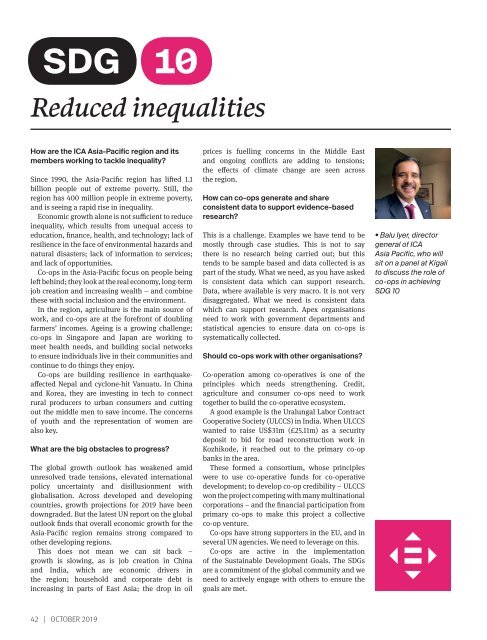Co-op News October 2019: Sustainable Development
The October 2019 edition of Co-op News looks at the UN's Sustainable Development Goals (SDGs) and how co-o-operatives can help make them happen – with interviews with Marc Noel, Vandana Shiva, Balu Iye, Maria Eugenia Perez Zea, Jurgen Schwettman and Patrick Develtere. We also speak with Michael Gidney, CEO of the Fairtrade Foundation about the impact of Brexit, and look at co-ops in the context of the UK's current politics.
The October 2019 edition of Co-op News looks at the UN's Sustainable Development Goals (SDGs) and how co-o-operatives can help make them happen – with interviews with Marc Noel, Vandana Shiva, Balu Iye, Maria Eugenia Perez Zea, Jurgen Schwettman and Patrick Develtere. We also speak with Michael Gidney, CEO of the Fairtrade Foundation about the impact of Brexit, and look at co-ops in the context of the UK's current politics.
Create successful ePaper yourself
Turn your PDF publications into a flip-book with our unique Google optimized e-Paper software.
SDG 10<br />
How are the ICA Asia-Pacific region and its<br />
members working to tackle inequality?<br />
Since 1990, the Asia-Pacific region has lifted 1.1<br />
billion pe<strong>op</strong>le out of extreme poverty. Still, the<br />
region has 400 million pe<strong>op</strong>le in extreme poverty,<br />
and is seeing a rapid rise in inequality.<br />
Economic growth alone is not sufficient to reduce<br />
inequality, which results from unequal access to<br />
education, finance, health, and technology; lack of<br />
resilience in the face of environmental hazards and<br />
natural disasters; lack of information to services;<br />
and lack of <strong>op</strong>portunities.<br />
<strong>Co</strong>-<strong>op</strong>s in the Asia-Pacific focus on pe<strong>op</strong>le being<br />
left behind; they look at the real economy, long-term<br />
job creation and increasing wealth – and combine<br />
these with social inclusion and the environment.<br />
In the region, agriculture is the main source of<br />
work, and co-<strong>op</strong>s are at the forefront of doubling<br />
farmers’ incomes. Ageing is a growing challenge;<br />
co-<strong>op</strong>s in Singapore and Japan are working to<br />
meet health needs, and building social networks<br />
to ensure individuals live in their communities and<br />
continue to do things they enjoy.<br />
<strong>Co</strong>-<strong>op</strong>s are building resilience in earthquakeaffected<br />
Nepal and cyclone-hit Vanuatu. In China<br />
and Korea, they are investing in tech to connect<br />
rural producers to urban consumers and cutting<br />
out the middle men to save income. The concerns<br />
of youth and the representation of women are<br />
also key.<br />
What are the big obstacles to progress?<br />
The global growth outlook has weakened amid<br />
unresolved trade tensions, elevated international<br />
policy uncertainty and disillusionment with<br />
globalisation. Across devel<strong>op</strong>ed and devel<strong>op</strong>ing<br />
countries, growth projections for <strong>2019</strong> have been<br />
downgraded. But the latest UN report on the global<br />
outlook finds that overall economic growth for the<br />
Asia-Pacific region remains strong compared to<br />
other devel<strong>op</strong>ing regions.<br />
This does not mean we can sit back –<br />
growth is slowing, as is job creation in China<br />
and India, which are economic drivers in<br />
the region; household and corporate debt is<br />
increasing in parts of East Asia; the dr<strong>op</strong> in oil<br />
prices is fuelling concerns in the Middle East<br />
and ongoing conflicts are adding to tensions;<br />
the effects of climate change are seen across<br />
the region.<br />
How can co-<strong>op</strong>s generate and share<br />
consistent data to support evidence-based<br />
research?<br />
This is a challenge. Examples we have tend to be<br />
mostly through case studies. This is not to say<br />
there is no research being carried out; but this<br />
tends to be sample based and data collected is as<br />
part of the study. What we need, as you have asked<br />
is consistent data which can support research.<br />
Data, where available is very macro. It is not very<br />
disaggregated. What we need is consistent data<br />
which can support research. Apex organisations<br />
need to work with government departments and<br />
statistical agencies to ensure data on co-<strong>op</strong>s is<br />
systematically collected.<br />
Should co-<strong>op</strong>s work with other organisations?<br />
<strong>Co</strong>-<strong>op</strong>eration among co-<strong>op</strong>eratives is one of the<br />
principles which needs strengthening. Credit,<br />
agriculture and consumer co-<strong>op</strong>s need to work<br />
together to build the co-<strong>op</strong>erative ecosystem.<br />
A good example is the Uralungal Labor <strong>Co</strong>ntract<br />
<strong>Co</strong><strong>op</strong>erative Society (ULCCS) in India. When ULCCS<br />
wanted to raise US$31m (£25.11m) as a security<br />
deposit to bid for road reconstruction work in<br />
Kozhikode, it reached out to the primary co-<strong>op</strong><br />
banks in the area.<br />
These formed a consortium, whose principles<br />
were to use co-<strong>op</strong>erative funds for co-<strong>op</strong>erative<br />
devel<strong>op</strong>ment; to devel<strong>op</strong> co-<strong>op</strong> credibility – ULCCS<br />
won the project competing with many multinational<br />
corporations – and the financial participation from<br />
primary co-<strong>op</strong>s to make this project a collective<br />
co-<strong>op</strong> venture.<br />
<strong>Co</strong>-<strong>op</strong>s have strong supporters in the EU, and in<br />
several UN agencies. We need to leverage on this.<br />
<strong>Co</strong>-<strong>op</strong>s are active in the implementation<br />
of the <strong>Sustainable</strong> Devel<strong>op</strong>ment Goals. The SDGs<br />
are a commitment of the global community and we<br />
need to actively engage with others to ensure the<br />
goals are met.<br />
• Balu Iyer, director<br />
general of ICA<br />
Asia Pacific, who will<br />
sit on a panel at Kigali<br />
to discuss the role of<br />
co-<strong>op</strong>s in achieving<br />
SDG 10<br />
42 | OCTOBER <strong>2019</strong>


















